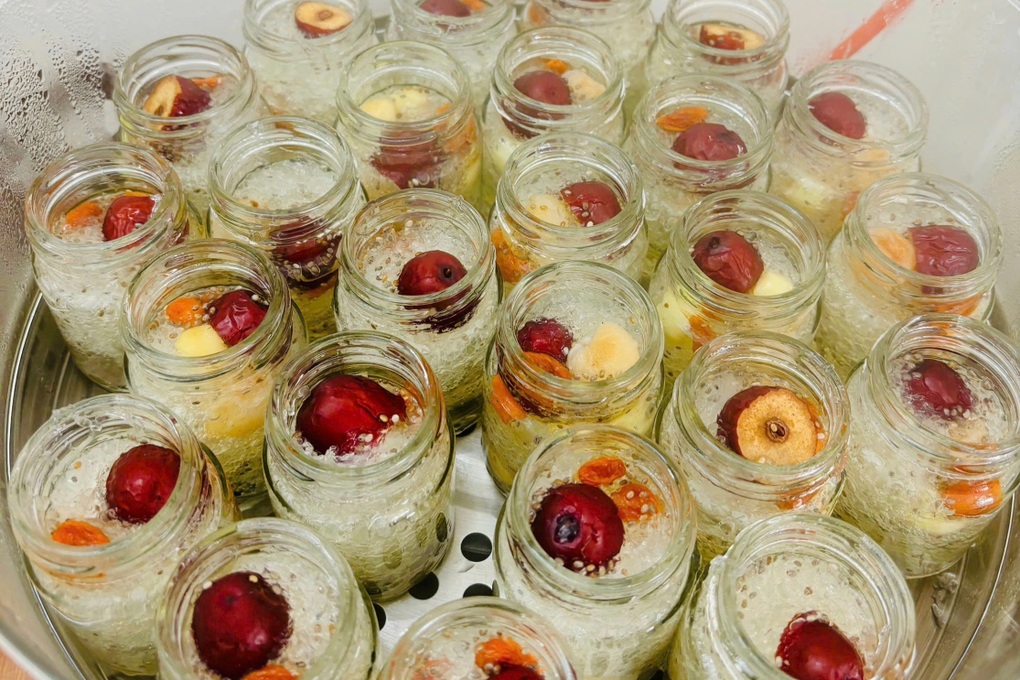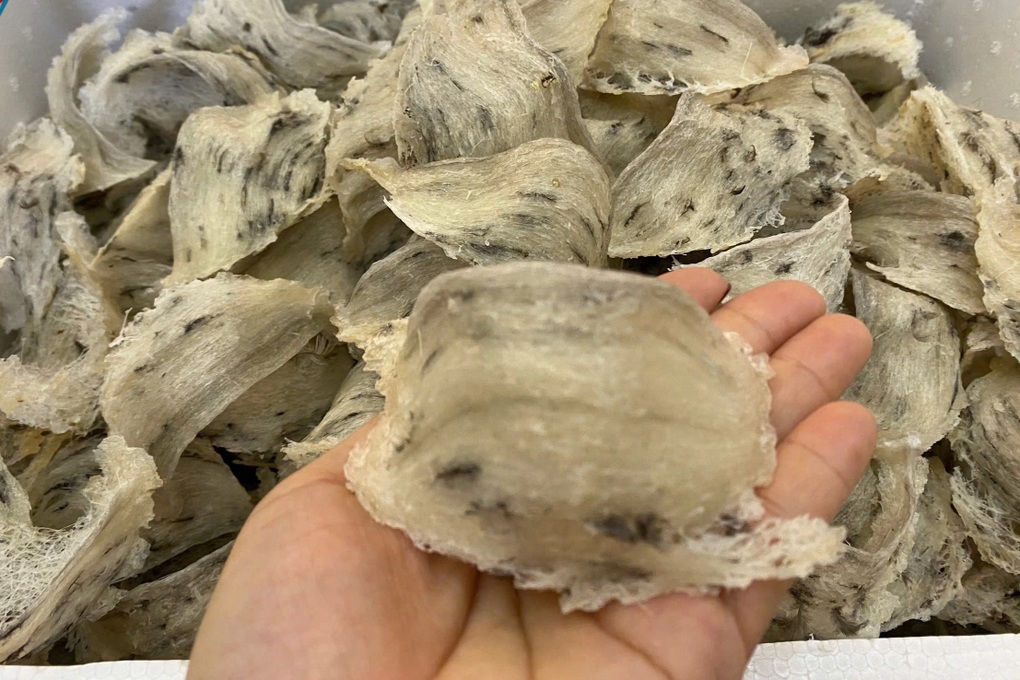Bird's nest has long been considered a precious and nutritious food. Bird's nest is not only a delicious dish but also contains many nutritional ingredients, bringing health benefits to many age groups.
Main ingredients of bird's nest
Protein is the main ingredient in bird's nest (about 50%), is easily absorbed, plays an important role in building tissue, maintaining metabolism, and restoring the body.
Bird's nest also contains 18/20 essential amino acids for humans. Of these, 9 types help the body develop and restore tissue.

Bird's nest has long been considered a "great tonic" food, helping to supplement nutrition and restore the body (Photo: Thanh Loan)
In addition, bird's nest also contains a lot of sialic acid. Sialic acid facilitates the development of ganglioside structures in the brain, helping to strengthen and improve the nervous system of infants.
Glycoprotein and polysaccharide in bird's nest have the effect of enhancing resistance, anti-inflammatory, supporting the digestive and immune systems as well as the respiratory tract.
Bird's nest also contains a lot of collagen and elastin. These two compounds help improve skin elasticity, support beauty and anti-aging.
Some other main and important ingredients in bird's nest are essential trace elements such as calcium, phosphorus, iron, zinc, manganese... which are good for metabolism, cell regeneration, and anti-oxidation.
With these ingredients, bird's nest is a nutritious food, cures physical weakness, and helps speed up the recovery process after illness and surgery.
Who should not eat bird's nest?
According to Dr. Huynh Tan Vu, University of Medicine and Pharmacy, Ho Chi Minh City, bird's nest has a sweet taste, neutral properties, helps treat body weakness, cough, coughing up blood, asthma, vomiting blood, stomach pain, long-term diarrhea...
This type of food is often used as a nutritious food for people who have just recovered from illness, are weak, the elderly, malnourished children, postpartum women with hemorrhage...

Bird's nests are made from the saliva of swiftlets living in caves and have high nutritional and commercial value (Photo: Thanh Loan).
However, when the body is in a state of acute inflammation, poor digestion, or metabolic disorders, consuming nutritious foods such as bird's nest not only does not help recover faster, but can also cause the digestive system to "burden" more, leading to diarrhea, bloating, indigestion, or prolonging the illness.
Specifically, people with colds, fever, headache, abdominal pain due to cold or bloating, cough with a lot of thin phlegm; people with symptoms of dermatitis, acute bronchitis, urinary tract infections, and fever should not use bird's nest.
For the elderly and people with weak digestive systems, continuous use of bird's nest will also have a negative impact on the digestive system, unable to absorb food and nutrients. The body cannot absorb all the nutrients in bird's nest, which can easily cause stomach cold and diarrhea.
In addition, bird's nest must be used for a long time to see all the benefits. When using bird's nest for nourishment, people should only use small doses (6-10g) for a long time.
Pregnant women should only use bird's nest when they are over 5 months pregnant. At this time, the fetus is stable, and both mother and baby need to supplement a lot of nutrients.
Sharing more, Dr. Vi Thi Tuoi, Deputy Director of the Nutrition Research and Consulting Institute - NRECI emphasized that people need to be aware that bird's nest is not a panacea and cannot help improve health if not used properly.
In particular, in children, the immune system and intestinal tract are still weak, the risk of allergies is high. The main ingredient causing food allergies in children is protein. Therefore, the protein in bird's nest can be considered a "foreign object" to the body, thereby causing allergies.
Therefore, children under 6 months of age should absolutely not use bird's nest. When children are over 6 months old and start eating solid foods, parents should prioritize familiar foods that have a low risk of allergies for children. When the baby is about 8-9 months old and has had a variety of foods, the child can try bird's nest.
Medical literature or major health organizations in the world do not have exact recommendations on the amount of bird's nest that babies can eat according to their age.
However, Dr. Tuoi noted that parents need to follow the principle of weaning: from little to much, from thin to thick, from simple to complex, gradually increasing the frequency of meals. Some mothers also eat a lot of bird's nest at once, which can cause bloating, indigestion, and constipation in babies due to the high protein content.
"The first few times you feed your baby, you should feed him/her 1-2 spoons, while parents also need to observe their child's reactions.
If there are unusual symptoms such as rash, hives, wheezing, difficulty breathing, fussiness, diarrhea, constipation, mucus in stool... after eating bird's nest, you should suspect an allergy and go to the hospital for examination," Dr. Tuoi shared.
Doctor Tuoi also recommends that when buying bird's nest, people should prioritize raw bird's nest or pure refined bird's nest, buy from reputable brands with food safety inspection to avoid products with whitening agents, additives, and artificial flavors.
Raw bird's nest should be soaked in filtered water at room temperature (30-60 minutes), do not soak for too long as it will cause loss of nutrients.
When steaming bird's nest, you need to use a specialized bird's nest steaming pot or steam it in a ceramic bowl in a pot of water, at the ideal temperature (about 70-80 degrees Celsius).
When stewing bird's nest, please note to add only a little rock sugar or other ingredients (such as red apples, lotus seeds) in the last 5-10 minutes when the bird's nest is almost cooked. For children under 2 years old or people with diabetes, stewed bird's nest without sugar can be prepared with porridge or soup.
After stewing, bird's nest should be used immediately or stored in a sealed glass jar, refrigerated, and used within 24-48 hours. Absolutely do not reheat repeatedly or store at room temperature for a long time, which can easily lead to bacterial contamination, deterioration, or use of products of questionable quality.
Source: https://dantri.com.vn/suc-khoe/yen-sao-rat-bo-duong-nhung-ai-khong-nen-an-20250516122700926.htm

























![[Photo] National Assembly Chairman attends the seminar "Building and operating an international financial center and recommendations for Vietnam"](https://vphoto.vietnam.vn/thumb/1200x675/vietnam/resource/IMAGE/2025/7/28/76393436936e457db31ec84433289f72)










































































Comment (0)